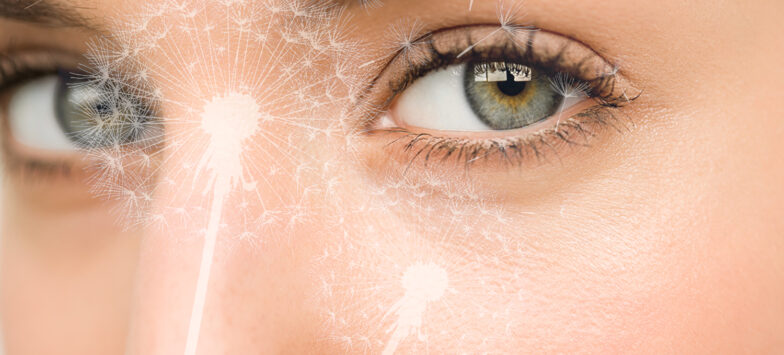
Springtime Eye Allergies: How do you Spell R-E-L-I-E-F
Ah, Spring! We usually can’t wait for it to arrive, but when it does many of us will experience eyes that are irritated due to seasonal allergies. When an allergen (like pollen) comes in contact with your eye, certain cells within your eye (called mast cells) release histamine and other substances to fight off the allergen. This reaction causes your eyes to become red, itchy, and watery.
Allergic conjunctivitis affects 15-40% of people, most frequently during spring and summer. It’s usually a temporary condition that goes along with nasal symptoms like stuffy nose and sneezing. When seasonal eye allergies strike they can make us feel miserable for weeks, so let’s look at some remedies that might help our eyes feel better.
Limiting Exposure
The key to treating eye allergies is to avoid or limit contact with the substance causing the problem. Spring is a challenge if you are allergic to pollen, but you can take some common-sense measures to limit the reaction:
• Avoid going outdoors as much as possible when pollen counts are highest, usually mid-morning and early evening.
• Avoid being outdoors when the wind blows pollens around.
• When you do go outdoors, wear sunglasses or eyeglasses to help prevent pollen from getting into your eyes.
• Keep your windows closed and use air conditioning in your car and at home. Keep air conditioning units clean.
• Don’t use window fans, since they will pull in pollen and other allergens.
• Rinse eyes frequently with fresh water.
• Always avoid rubbing your eyes, which only irritates them more!
Treatments
Although allergen avoidance is the best remedy, it’s not always practical or possible. Some exposure to irritants is almost inevitable, but there are things you can do to treat seasonal allergic conjunctivitis, such as:
• Apply cool (cold) compresses. This might be a washcloth soaked in cool water and wrung out. Used tea bags cooled and squeezed to damp can help reduce puffiness.
• Moisten cotton balls or pads with a weak sodium bicarbonate solution, or cooled calendula or chamomile tea (patch test for allergy first).
• Try artificial tear eyedrops to add moisture and help wash allergens from the eyes.
• Oral antihistamines may help with itching, but they can make eyes dry and even worsen eye allergy symptoms.
• Antihistamine eyedrops, available over-the-counter or by prescription, can ease itchy, red, swollen eyes. Side effects might include headaches and dry eyes. If antihistamine drops sting or burn, try keeping them in the refrigerator or using refrigerated artificial tear drops before you use them.
If you have any doubt about the source of your irritated eyes, or if your symptoms seem severe or interfere with your vision, your Atlantic Eye ophthalmologist will check to see if you have allergic conjunctivitis or something more serious, like an eye infection, to determine the best treatment for you.
